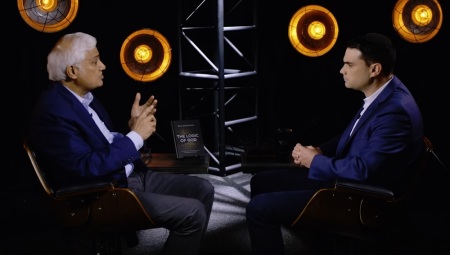Ravi Zacharias shares the 'most important phrase in the Ten Commandments'

Renowned Christian apologist Ravi Zacharias sat down with popular Jewish conservative commentator Ben Shapiro to discuss a number of philosophical and theological topics, including what he believes to be the "most important phrase" in the Ten Commandments.
The 73-year-old evangelical, who was born into a high-caste Hindu family in India and now travels the world spreading the Gospel of Jesus Christ, participated in a recent one-hour interview on Ben Shapiro's "Sunday Special."
During the show, which is hosted on the Shapiro-founded conservative news and opinion website The Daily Wire, Shapiro asked Zacharias to respond to claims by prominent atheists that moral law, if it does exits, seems to have evolved over the course of centuries.
"Take an example like slavery," Shapiro said. "Originally, the Bible contemplates that slavery is part of life. And then over time, we have decided that not only is slavery not a part of life, but slavery is also a grave evil that ought to be fought wherever it exists. How do we justify evolution in the Judeo-Christian framework of morality?"
Zacharias, an author and the founder of Ravi Zacharias International Ministries, responded by stating that such an argument comes from the "metaphysical extrapolation of the naturalistic interpretation of the very origin of life."
"When you talk about the evolution of humanity itself, they want to talk about the morality itself as also sort of evolving. I think it becomes a circular argument," Zacharias said. "The argument that somehow we were valueless to start with and just happened to be on the radar screen of life and that we developed all these things over a period of time, I think, is a false view of the beginnings. In fact, you know very well as a scholar within the Jewish framework, the very concept of slavery was a very different idea of what we interpret as slavery is all about."
"When you talk about Paul talking about how to treat the 'slave' in the household and that he was willing to redeem this person in a socio-economic framework that you have these kinds of terms used and systems used, we are bound to make blunders," he added. "I would then turn the question on its head and say, 'All right, if you believe we have evolved morally, why is it in the 20th century that we killed more people in warfare than all of the previous 19 centuries put together?'"
Zacharias contended that the claim that moral law has evolved is "not an honest representation of how we have come into belief in moral law framework."
"In fact, there are some things now that really have reversed over 5,000 years of civilized history," the itinerant speaker said. "For thousands of years, some people would never believe what we have begun to believe."
Zacharias brought up the Ten Commandments, a set of moral principles handed down to prophet Moses by God for all people at Mount Sinai. While many people place emphasis on the rules for human behavior outlined in the Ten Commandments, Zacharias stressed the importance of another aspect.
"The most important phrase to me is 'I am the Lord your God that brought you out of the land of Egypt,'" Zacharias detailed. "[It shows] that redemption is prior to righteousness and righteousness leads one to worship. So when you get to Exodus 20 and you are reading that beautiful moral law and then you move five chapters later and you move into the tabernacle and the framework of reference, I think it is the change of heart that is the only answer to the moral framework."
According to Zacharias, the "scary thing" is that God did not send the world his message to "make bad people good." Zacharias said, stressing that "morality alone will never save us."
"Sometimes in the name of morality, people have done some horrible things. It is the fact that the heart is in need of redemption and in need of forgiveness," he said. "It is the fact that redemption must precede righteousness. So to talk about morality having been evolved, when you go back 3,500 years ago and the moral law was given to us, it was because people had already violated that relationship with God."
"So I say as far as morality evolving, right from the beginning we have known what it was all about," he continued. "So what happens in the first three chapters of Genesis happens in this world every day. What happened in the temptation saga, I think, is very critical and [Shapiro's] book points out what has happened as a result of this flaw."
Zacharias added that the idea of violating the authority of God, becoming autonomous and people blaming others for their own faults "has not evolved."
"This goes back over three millennia and we have challenged it every day in this victim culture," Zacharias said. "On one hand, we claim to be autonomous but when we go wrong, we blame somebody else. I do not accept this idea that it has somehow evolved."
In one of the final questions of the interview, Shapiro asks Zacharias what he thinks "Christianity adds to the world that Judaism didn't in the first place."
"I don't like to say the word 'add' because it seems like it was something that is superimposed that wasn't there. I think it is already there," Zacharias said. "I think that it is that one line that the moral law hangs upon. 'I am the Lord your God that brought you out of the land of Egypt.' That redemption motif, I think it moved beyond the metaphor of Egypt, although it was real. I think it moved beyond the blood sacrifices and it moved the very person of the Son of Man that Daniel talked about and the perfection of the law, which was not violated but affirmed and endorsed."
Follow Samuel Smith on Twitter: @IamSamSmith
or Facebook: SamuelSmithCP





















